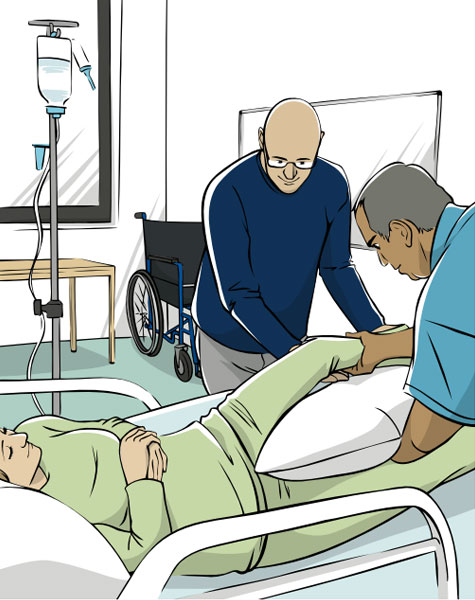
Download IQ Good Practice as PDF
including hands-on report and interview with Sabrina Flaus, project manager of the subproject "IQ Refresher training for nurses with qualifications acquired abroad."
Project-integrated practice mentoring
Centrally organised support at a local level eases the burden on placement organisations and offers a pathway for the recognition of participants’ foreign nursing qualifications
Starting position/challenge
The delivery of taught clinical practice is the key bottleneck in adaptation periods for general nurses. For capacity reasons, it is often difficult or even impossible for the practice locations to provide practice mentors internally for participants. Training obligations and day-to-day necessities generally take priority.
Implementation of "project-integrated practice mentoring"
The IQ "Refresher training for nurses with qualifications acquired abroad" subproject from the provider SHG Bildung gGmbH in the IQ Network Saarland has initiated project-integrated practice mentoring (PiP) which undertakes the mentoring in all organisations. This enables participants to receive the necessary time to compensate for missing periods of training. It eases the burden on the organisations and at the same time ensures quality across various practice locations. Key to the successful deployment of the PiP is establishing a position of trust in the practice organisation.
Only by establishing trust can it be guaranteed that the PiP will fulfil all of the institution's professional requirements, participate without intervening unasked in on-site procedures and guarantee confidentiality. In addition, the project-integrated practice mentor acts as a key contact person in working with language barriers and culturally sensitive communication.The completion of relevant training facilitates the delivery of content in a manner appropriate to the target group. The PiP coordinates the practice mentoring according to the requirements of participants.
The needs are determined in discussion with participants, by means of practical exercises in the theory phase and by consulting with nursing managers, in-house practice mentors or the ward managers of the cooperating organisations with whom the placement dates are agreed. A PiP adopts a neutral role and is not employed in the operational practice of the placement organisation. This avoids any conflict of interest between day to day-work and training. One aspect is the high degree of dependability when keeping to the times for scheduled practical instruction. This is because the PiP is not part of the cooperating organisation and therefore cannot be used to support the day-to-day work on the ward if somebody suddenly falls sick in the nursing team.
Conclusion
A project-integrated practice mentor acts as the interface between the cooperating organisations and project management – a role which has proven successful in practice. The very positive feedback from all participants also confirms this. Participants feel they receive better supervision, acquire competencies more quickly and improve their status because, as a result of the PiP’s mentoring, they are no longer perceived as "interns". In-house trainers value the reduced workload and the opportunity to exchange views and ideas with a colleague, and the organisation management teams are thankful for the external support.
Addressees for transfer:
Training providers and companies
Project-integrated practice mentoring
Refresher training in the nursing sector is often required to compensate for insufficient time spent training in practice. In order to ease the burden on staff in placement locations, a centralised, project-integrated practice mentor (PiP) is provided through the project. They serve as key contact person in working with language barriers and culturally-sensitive communication, and are a constant point of reference for participants completing the adaptation period. The PiP coordinates the practice mentoring according to participants’ requirements, e.g. with the use of practical exercises in the theory phase completed by participants.
Project:
IQ Refresher training for nurses with qualifications acquired abroad.
Provider:
SHG Bildung gGmbH
Project contact:
Sabrina Flaus, Konrad-Zuse-Straße 3a, 66115 Saarbrücken, s.flaus(at)bildung.shg-kliniken.de
